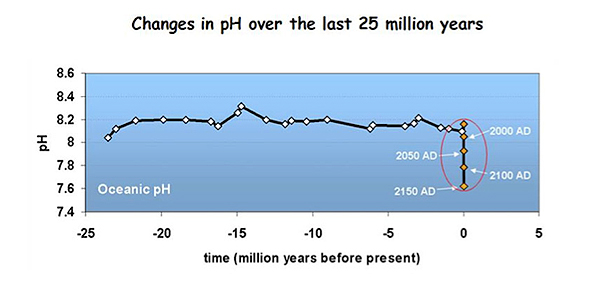
Campaigning for marine protection was my first love, long before I was aware of the threat of climate change, and over the years I have run many campaigns in both areas. Once upon a time, these felt like separate issues, but climate change has now been established as the single greatest threat to the oceans.
So when the folks at the International Program on the State of the Ocean invited me to attend a high-level interdisciplinary scientific workshop in Oxford last week, I jumped at the chance. I was anxious to find out what exactly is happening in the oceans, and more importantly, what the climate and marine communities, working together, could do to help.
In attendance were some of the most recognized marine scientists working in a number of different fields, and they came to Oxford to better understand what is happening to the oceans on a global scale. The findings from the workshop will not be published until next month, but trust me when I tell you that our oceans are in far worse shape than I had feared and -- here's the really scary part -- much worse than even they had previously understood.
You know that feeling when the plane hits turbulence and you look at the faces of the flight attendants for reassurance, but instead you see nothing but tight-lipped grimaces? That's what it felt like at the workshop. No one looked relaxed and given the generally non-alarmist demeanor of most scientists, I knew this was cause for great worry.
That rising CO2 emissions are taking their toll on the oceans is not new information. But the realization that this is happening faster and with greater magnitude than had been previously predicted was a surprise apparently even to them. Combined with the decreased resilience of marine ecosystems to adapt to change as a result of overfishing, marine pollution, resource extraction and other stresses, all this points to one inescapable conclusion -- we're looking at an ocean of trouble.
One participant likened the situation to a game of Jenga, where little wooden blocks stacked in a tower are removed from the middle and replaced at the top, one by one, until the structure becomes so unstable that it comes crashing down. The blocks at the base of the ocean Jenga tower, the little critters at the bottom of the food chain, are getting hit from all sides. And anyone who's ever played that game knows that it's a very, very bad idea to start pulling out the blocks at the bottom.
First, there's Ocean Acidification which has been referred to in one report as "the evil twin of climate change." Oceans are in an unprecedented pH free fall:

Turley et al, 2006 Courtesy of Jelle Bijma
While there are likely to be both winners and losers in the climate-plankton sweepstakes, this report suggests that:
...the likely new dominant phytoplankton and plant species in the future acidified ocean may be less able to support the productive, diverse food chains that we presently rely on to support healthy ocean ecosystems and fisheries resources.
In other words, bye-bye seafood industry as we know it.
Second, there's Ocean Warming which will also likely see both winning and losing species, but as reported in Scientific American in 2009 the consequences could be significant:
As temperature rises, the zooplankton start to grow faster than the phytoplankton. The zooplankton are more abundant and faster-growing, and are able to eat all the phytoplankton in warmer water. This creates a bottleneck in the food chain that could have large implications for the ocean's food web.
Changes in the food web in both the Arctic and Antarctic oceans are already being reported, and they're having knock-on effects for animals further up the food chain. Wayne Trivelpiece, a wildlife biologist with the National Oceanic and Atmospheric Administration in a recent report describes the starvation in penguin populations likely due to a reduction in krill as "... one of the great examples of how very small changes -- what a guy on the street might consider not-too-dramatic -- can have tremendous impacts in certain systems."
There goes another Jenga block.
And if by some miracle the ocean tower remains standing after yanking out the blocks at the base, what happens when we remove the coral reefs, polar bears, and top predators such as sharks, and blue fin tuna?
This is the problem with single-issue approaches to assessing the threats to the ocean, as in the case of an op-ed by Ray Hilborn in the New York Times last week suggesting that overfishing is not as much of a problem as it's been made out to be.
The ocean covers more than 70% of the Earth's surface. More than half a billion people owe their livelihoods to the seafood industry and fish is a primary source of protein for some of the world's poorest people. Countless more depend on healthy seas for tourism and recreation.
But that's not all, because the ocean plays a central role in regulating climate and weather.
I don't think it's an exaggeration to say that each and every human being -- all (nearly) 7 billion of us -- depends on a healthy, functioning ocean for our survival.
The report of last week's workshop will include a blueprint for action, and we would be well advised to implement it as quickly as possible. In the meantime, we must redouble our efforts to achieve drastic, urgent reductions in CO2 emissions in order to give our oceans a fighting chance.
As one participant in last week's workshop said, a third of the worlds coral reefs have already disappeared, and another third is already doomed to follow suit. But the fact that we can still save that final third means there's both great hope and great urgency for us all.
